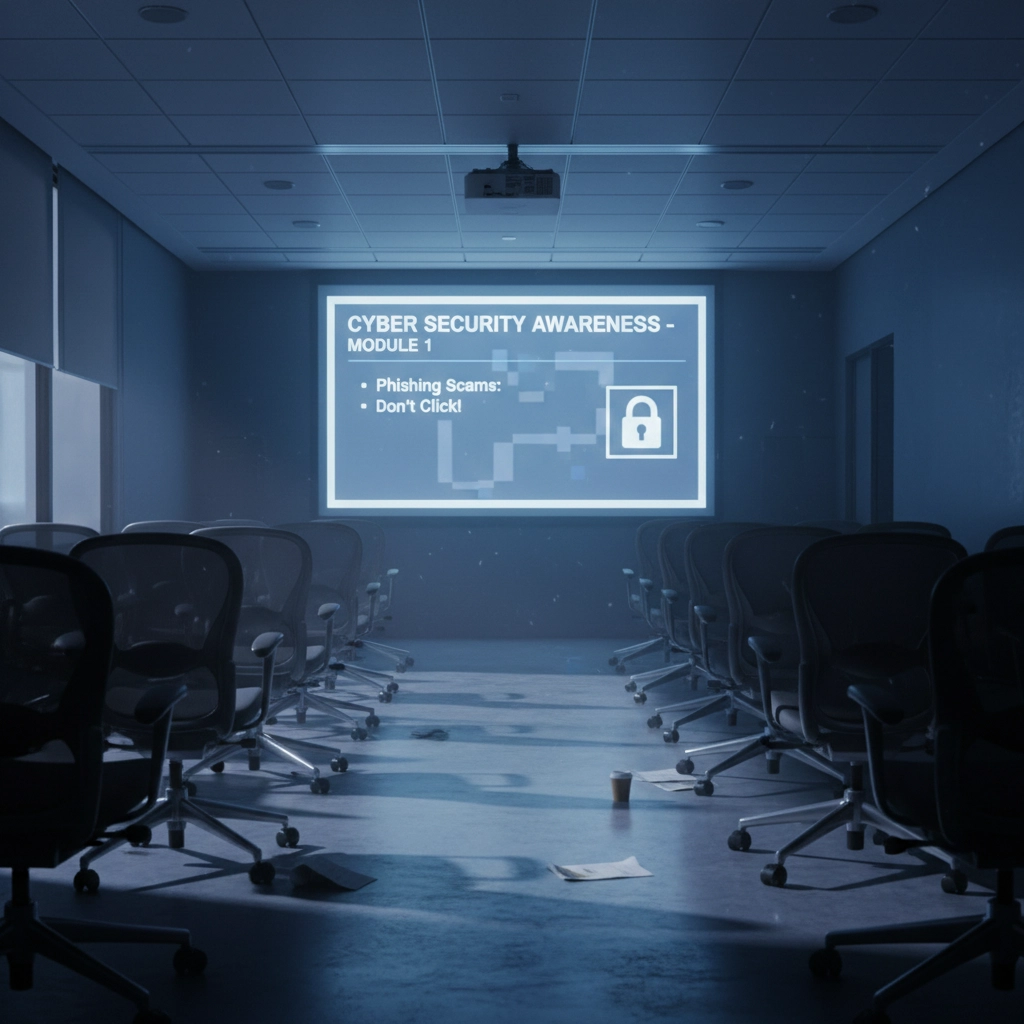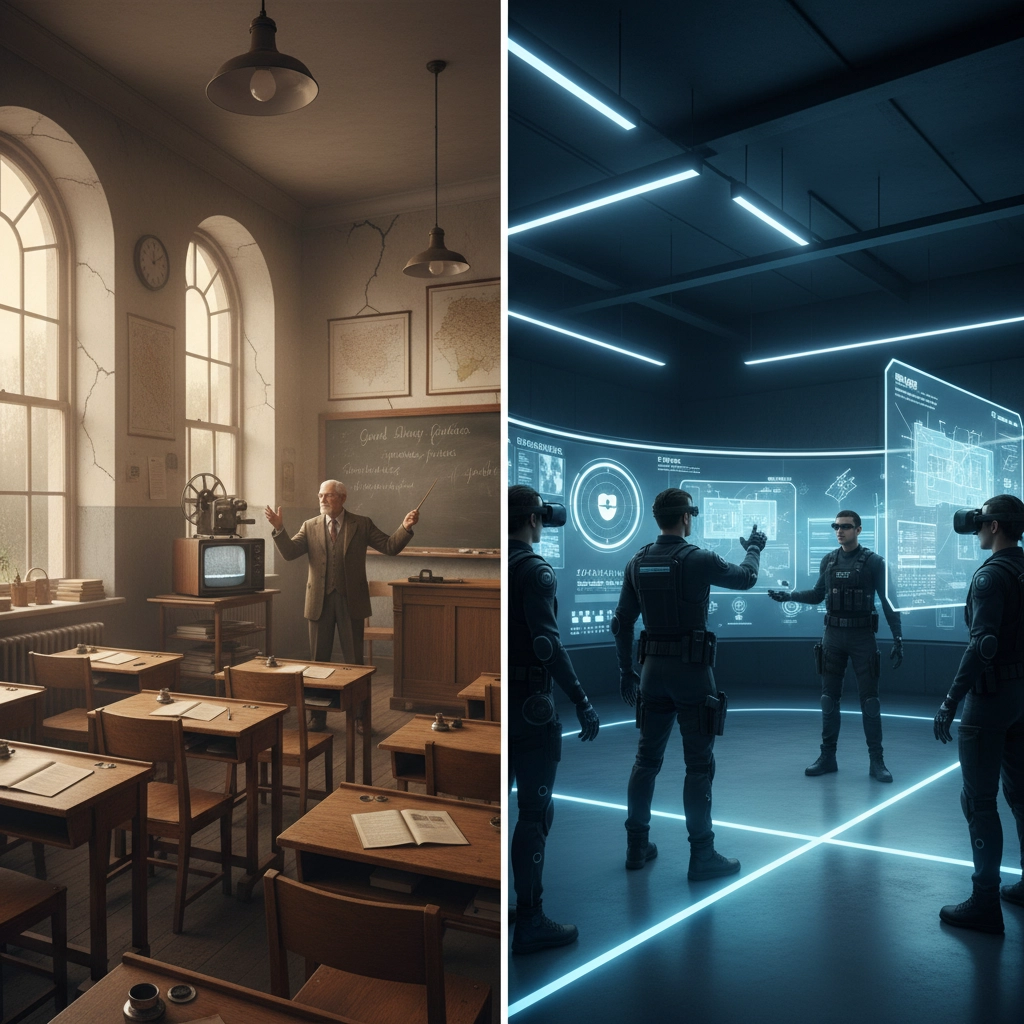Why Corporate Clients Are Ditching Basic Security Training (And What They Want Instead)
- bouf55
- Sep 19
- 5 min read
Remember when corporate security training meant sitting through a dusty PowerPoint about "don't click suspicious links"? Those days are officially over. Companies across Canada are dumping their basic security programs faster than you can say "phishing email," and there's a good reason why.
The old-school approach to security training isn't just outdated: it's actually making things worse. While employees zone out during mandatory annual sessions, real threats are getting smarter, more sophisticated, and way more dangerous. Corporate clients have figured this out, and they're demanding something completely different.
The Death of "Check the Box" Training
Here's what's really happening: traditional security training has become nothing more than a compliance exercise. Companies schedule their annual "security awareness" session, employees click through some slides, pass a basic quiz, and everyone pretends the organization is now "secure."
But this approach has some serious problems:
• Generic content that doesn't stick: One-size-fits-all training treats the CEO the same as the intern, even though their security risks are completely different • Outdated threat examples: Teaching people to spot "obvious" phishing emails when modern scams use AI to create perfect grammar and convincing storylines • No real-world application: Employees learn about threats in theory but never practice responding to actual incidents • Focus on completion, not competence: Success gets measured by how many people finished the course, not whether they can actually identify and respond to threats
The result? About 8% of employees still account for 80% of security incidents, even after completing "training." That's not training: that's theater.

What Corporate Clients Actually Want Now
Smart companies have realized that modern security threats require modern training solutions. They're not just looking for better content: they want a completely different approach.
Personalized, Role-Based Learning
Instead of generic training, companies want programs tailored to specific roles and risk profiles. A finance manager handling sensitive data needs different skills than a marketing coordinator or a warehouse supervisor.
The best corporate clients are asking for: • Risk-specific scenarios: Training that matches the actual threats each role faces • Adaptive learning paths: Content that adjusts based on individual performance and learning speed • Behavioral analysis: Programs that identify high-risk users and provide targeted intervention
Interactive, Hands-On Experiences
Forget boring slideshows. Companies want training that feels more like a video game or escape room than a compliance requirement.
Popular formats include: • Simulated cyber attacks: Safe environments where teams can practice responding to real incidents • Gamified learning: Points, badges, and leaderboards that make security training actually engaging • Crisis management exercises: Full-scale simulations where teams must coordinate responses under pressure • Interactive workshops: Hands-on sessions where employees learn by doing, not just watching
Technology Integration Training
Here's where things get really interesting. Companies aren't just worried about traditional security anymore: they need employees who understand the intersection of physical security, cybersecurity, and emerging technologies.
Corporate clients are specifically requesting training on: • AI and machine learning threats: How artificial intelligence is changing the security landscape • Drone security protocols: Understanding airspace regulations and privacy concerns • IoT device management: Securing the growing number of connected devices in workplaces • Social engineering 2.0: Advanced manipulation techniques that go far beyond simple phishing

Leadership and Crisis Management Skills
Basic security guards are being replaced by security professionals who can think strategically and lead during emergencies. Companies want people who can:
• Make decisions under pressure: When systems fail at 2 AM, who's going to coordinate the response? • Communicate with executives: Security incidents often require board-level reporting • Manage multi-agency responses: Coordinating with police, fire, IT, and external contractors • Document and analyze incidents: Turning security events into learning opportunities
The Compliance Revolution
Canadian businesses are dealing with an explosion of new regulations, and they need security professionals who actually understand them: not just people who can recite basic policies.
Current compliance hot topics include:
Privacy Legislation • PIPEDA updates and provincial variations • Cross-border data transfer requirements • Breach notification protocols
Industry-Specific Requirements • Financial services regulations • Healthcare privacy standards • Critical infrastructure protection
Emerging Standards • ESG (Environmental, Social, Governance) security components • Supply chain security requirements • Remote work security protocols
Companies are realizing that basic security training doesn't even scratch the surface of modern compliance requirements. They need professionals who can navigate complex regulatory environments and actually implement effective controls.

Real-World Examples of the Shift
Let's look at what forward-thinking companies are actually doing:
Major Canadian Bank: Ditched their annual "cybersecurity awareness" session for monthly, role-specific simulations. Customer service reps practice handling social engineering calls, while executives work through data breach response scenarios.
Tech Startup in Toronto: Replaced basic security training with "capture the flag" cybersecurity competitions where teams compete to find and fix vulnerabilities in simulated environments.
Manufacturing Company: Now requires all supervisors to complete crisis management certification, including coordination with emergency services and business continuity planning.
Professional Services Firm: Implemented AI-driven personalized learning that tracks each employee's specific risk behaviors and adjusts training content accordingly.
Why Traditional Training Providers Can't Keep Up
Many established training companies are struggling to adapt because they're still thinking about security the old way. They're trying to update their content when they really need to rebuild their entire approach.
The companies winning these contracts understand that modern security training needs to: • Start with behavior change, not information transfer • Use data to personalize and improve programs continuously • Integrate with real business operations, not exist in isolation • Prepare people for careers, not just current job requirements
How to Position Yourself for These Opportunities
If you're working in security or thinking about entering the field, here's what you need to know:
Essential Modern Skills • Crisis management and incident response • Technology integration (AI, drones, cybersecurity) • Leadership and communication • Regulatory compliance across multiple frameworks • Data analysis and reporting
Certifications That Matter • Advanced incident response credentials • Leadership and management training • Technology-specific certifications (drone operations, cybersecurity) • Industry-specific compliance programs
Experience That Stands Out • Multi-disciplinary training that crosses traditional boundaries • Real-world scenario practice, not just theoretical knowledge • Continuous learning and adaptation to new threats • Proven ability to work with diverse stakeholders

The SecuGuard Academy Advantage
At SecuGuard Academy, we saw this shift coming years ago. While other training providers were still updating their PowerPoint slides, we were building programs that prepare security professionals for the future of the industry.
Our approach includes: • Real-world scenario training that goes far beyond basic security protocols • Technology integration courses covering everything from drone operations to AI threat detection • Leadership development programs specifically designed for security professionals • Compliance mastery tracks that cover Canadian regulations in depth • Continuous learning platforms that adapt to emerging threats and industry changes
We're not just teaching people to be security guards: we're developing the security leaders that companies actually want to hire.
Ready to Level Up?
The security industry is changing fast, and basic training isn't going to cut it anymore. Companies are looking for professionals who can think strategically, adapt quickly, and lead effectively in complex situations.
Don't get left behind while the industry moves forward. The time to upgrade your skills is now, while the opportunities are still growing and before the competition catches up.
Explore SecuGuard Academy's advanced programs and see how we're preparing the next generation of security professionals for careers that actually matter.
The companies ditching basic training aren't just looking for someone different: they're looking for someone better. Make sure that someone is you.

Comments